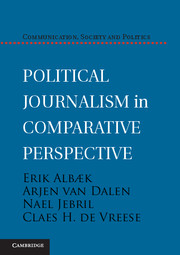Book contents
- Frontmatter
- Contents
- List of Tables and Figures
- Preface
- 1 Introduction
- 2 Comparing Political Journalism
- 3 Journalists
- 4 Journalists and Politicians
- 5 Do Role Conceptions Matter?
- 6 What Type of Journalism Produces Public Knowledge?
- 7 Does Infotainment Journalism Lead to Political Cynicism?
- 8 Good Journalism, Satisfied Citizens?
- 9 Political Journalism
- Appendix to Chapter 2
- Appendix to Chapter 3
- Appendix to Chapter 4
- Appendix to Chapter 5
- Appendix to Chapter 6
- Appendix to Chapter 7
- Appendix to Chapter 8
- References
- Index
6 - What Type of Journalism Produces Public Knowledge?
Published online by Cambridge University Press: 05 June 2014
- Frontmatter
- Contents
- List of Tables and Figures
- Preface
- 1 Introduction
- 2 Comparing Political Journalism
- 3 Journalists
- 4 Journalists and Politicians
- 5 Do Role Conceptions Matter?
- 6 What Type of Journalism Produces Public Knowledge?
- 7 Does Infotainment Journalism Lead to Political Cynicism?
- 8 Good Journalism, Satisfied Citizens?
- 9 Political Journalism
- Appendix to Chapter 2
- Appendix to Chapter 3
- Appendix to Chapter 4
- Appendix to Chapter 5
- Appendix to Chapter 6
- Appendix to Chapter 7
- Appendix to Chapter 8
- References
- Index
Summary
In the first part of the book, we focused mainly on the antecedents and characteristics of political news in countries with different media systems. In the second part we look at the effects of different types of political reporting on the public (see Figure 1.1, Chapter 1). This part also serves to identify the right mix of conditions for a positive role of political journalism. We move from the effect of conditions on content to the effects of content on users. The chapter will specifically investigate such effects in relation to knowledge about politics. The news media is one of the most important sources of information on politics and is therefore a key contributor to citizens’ political knowledge. Previous literature has demonstrated that political knowledge is a predictor of political involvement (McGraw & Pinney, 1990) and electoral turnout (Neuman, 1986; Delli Carpini & Keeter, 1996), and also that greater political knowledge generates more participation and greater tolerance of opposing viewpoints (Jerit, Barabas, & Bolson, 2006). Moreover, political knowledge is a key ingredient in virtually all models of democracy (Strömbäck, 2005). It is considered the “currency of citizenship,” which can be acquired over time and spent on various social goods, such as voting, political action, and deliberating with and persuading others (Delli Carpini & Keeter, 1996, 8).
Assuming that sound political knowledge is vital to the good health of a democracy, we might expect the media's impact on knowledge to have been exhaustively researched. Much of what we know, however, is based either on assumptions about news media content or on correlational evidence. In this chapter we focus on the impact that two of the most widely used news frames – human-interest and conflict – have on political knowledge. Both news frames are important indicators of a pragmatic journalistic approach to politics (see Chapter 1) and are used frequently in political news coverage (see Chapter 5). We develop an argument for the reason news coverage using this approach has a positive effect on knowledge acquisition, particularly for those with minimal interest in politics. We test the relationship between pragmatic news coverage and political knowledge by drawing on a combination of both the panel survey data and the content analysis between the two panel waves in Denmark, Spain, and the United Kingdom (see Appendix to Chapter 2).
- Type
- Chapter
- Information
- Political Journalism in Comparative Perspective , pp. 94 - 118Publisher: Cambridge University PressPrint publication year: 2014



